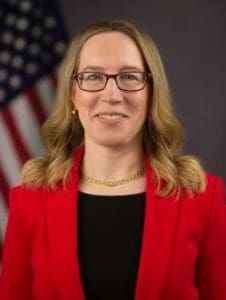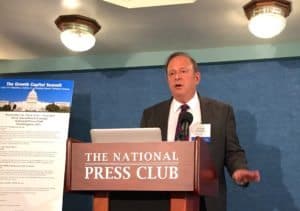President Trump: It’s High Time for a few More Tweets to SEC Chairman Jay Clayton
Any good litigator can tell you that the difference between success and failure is often the ability to ask the right questions – at the right times – and asking the right follow up questions. This can be the difference between success and failure – and how long it takes to get there. Delays often have consequences. And like it or not, when it comes to our government, delays are typically the order of the day.
Case in point: The Donald Trump “SEC Tweet”
Donald Trump shook the halls of the SEC’s headquarters on August 17 when he so much as mentioned the SEC in one of his infamous Tweets. Trump tweeted:
“In speaking with some of the world’s top business leaders I asked what it is that would make business (jobs) even better in the U.S. “Stop quarterly reporting & go to a six month system,” said one. That would allow greater flexibility & save money. I have asked the SEC to study!”
In speaking with some of the world’s top business leaders I asked what it is that would make business (jobs) even better in the U.S. “Stop quarterly reporting & go to a six month system,” said one. That would allow greater flexibility & save money. I have asked the SEC to study!
— Donald J. Trump (@realDonaldTrump) August 17, 2018
The response from the SEC’s Chair, Jay Clayton, was faster than a speeding blockchain. Within hours Chairman Clayton issued a five sentence public statement, entitled “Statement on Investing in America for the Long Term.” Following are three of the five sentences of the Release:
“In addition, the SEC’s Division of Corporation Finance continues to study public company reporting requirements, including the frequency of reporting. As always, the SEC welcomes input from companies, investors, and other market participants as our staff considers these important matters.”
Yes, Mr. President, we at the SEC are already on top of this. We thank you for your input.
Others more steeped in the public markets dominated by institutional investors were less polite in reacting: no way they were going to invest large sums of other peoples’ money (not to mention their own) in public companies absent the full transparency that quarterly reporting ensures.
Unfortunately, our President asked the wrong question.
If you don’t ask the right question, you won’t get the right answer. And if you are not adequately informed you are unlikely to ask the right question – at least not the first time.
In all fairness, our President is a creature of private markets and real estate. Undoubtedly, the regulatory structure of capital markets is not his strong suit. To be blunt: he is no Joe Kennedy! (the first Chair of the SEC and the father of Jack Kennedy). But what he surely understands is that most bureaucrats are neither risk takers nor innovators – especially if they value job security or their commercial value after leaving public service. Our SEC historically has proven to be no exception to this rule.
Bureaucrats need to do more than “study” an issue – especially when there is no deadline for that final exam. Sometimes bureaucrats need to be told what to do – by a higher authority.
The Right Question
 To have asked the right question would have required some basic knowledge of SEC Regulation A+ and its modern origin, the Jumpstart Our Business Startups Act of 2012 (the JOBS Act). Since 2015 we have had in place a regulatory structure which permits companies to raise capital from the public, and to take advantage of a reduced onramp to public reporting which includes semi-annual reporting!
To have asked the right question would have required some basic knowledge of SEC Regulation A+ and its modern origin, the Jumpstart Our Business Startups Act of 2012 (the JOBS Act). Since 2015 we have had in place a regulatory structure which permits companies to raise capital from the public, and to take advantage of a reduced onramp to public reporting which includes semi-annual reporting!
One of the questions our President should have asked / Tweeted is whatever happened to raising the offering limits on Regulation A+ from $50 million per year, and how can we make this Regulation less burdensome to issuers and more attractive to investors? . In fact, when Congress passed the JOBS Act in 2012, it expressly directed the SEC to periodically study the question of whether the original $50 Million ceiling should be raised – and under what conditions.
Unfortunately, to the dismay of many, including two SEC Commissioners, the Commission is unwilling to even study this question through its rulemaking process. In the words of Commissioners’ Hester Peirce and Michael Piwowar in April 2018:
“That said, the undersigned are persuaded that the time to commence that careful study is now, not when the kicked can comes to rest a couple of years down the road.”
A Suggested Answer to the Right Question
One possible answer to the question I posed might have been: Raise the Annual Regulation A+ limit to $100 Million, but require that larger offerings be shepherded by a licensed broker-dealer to ensure greater protection for Main Street investors. But do not expect the SEC to study this issue any time soon.
And then there is Regulation CF
Many industry participants have long argued vociferously for raising the federal investing crowdfunding limit in Regulation CF to a level much above the current $1.070 Million limit – pegged at $5 million in the original draft legislation championed by Congressman Patrick McHenry in 2011. Though there is disagreement as to how high is too high, there are many benchmarks to look to – including the $5 million crowdfunding limit in the State of Georgia, thanks to the efforts of a former businessman and current Georgia Secretary of State and gubernatorial hopeful, Brian Kemp – not to mention our counterparts in the UK and the EU.
As Jim Morrison of the Doors reminded us: “You cannot petition the Lord with prayer.”
 We cannot count on federal administrative agencies to innovate. Likewise, these innovations are likely to be slow in coming, if at all, if the public is dependent solely upon these governmental agencies. And waiting on Congress to act is not usually a very sanguine option, given the seemingly perpetual state of Congressional gridlock.
We cannot count on federal administrative agencies to innovate. Likewise, these innovations are likely to be slow in coming, if at all, if the public is dependent solely upon these governmental agencies. And waiting on Congress to act is not usually a very sanguine option, given the seemingly perpetual state of Congressional gridlock.
Nor do I hold out much hope for public petitions calling on the SEC for change. The SEC already has an institutionalized framework allowing for any member of the public to submit a rulemaking petition on its website. Unfortunately, in the past it has largely served as a graveyard for good ideas.
A recent case in point is the rulemaking petition submitted by Vincent Molinari back in March 2017, calling for the SEC to “study” the regulation of digital assets and blockchain technology – by way of a public concept release comment process. So far, only one Release in July 2017, the so called DAO Release, addressing a very cut and dry issue for most securities lawyers (which is why I refer to it as the “Duh Release”), leaving the difficult questions unanswered. Otherwise, no movement by the SEC to even “study” this issue with the participation of industry participants – through a “concept” proposal. Only a steady barrage of informal admonitions by Chairman Clayton from the Bully Pulpit.
A Path Forward
Well, when things seem hopeless, as they sometimes do in life, humor may provide the only short-term solution. Seems that the Bully Pulpit has proven to be the most effective means of change at the SEC – without the time, expense and formalities of rulemaking and legislation. Witness the barrage of public statements emanating from the SEC Chair since July 2017 – all but killing the ICO (Initial Coin Offering) market in the US. So perhaps our President can fire a few more Tweets at the SEC – but this time better focused – and better informed. After all, didn’t he run on a platform of reducing government regulations in order to create Jobs Jobs and more Jobs – till the country is sick of creating Jobs. And after all, aren’t government regulations which unduly limit capital formation sorta like tariffs – with the same impact – sending economic growth (and jobs) off shore.
So how about taking to the Twitterverse (or otherwise) to encourage our President to send out a few short, well crafted, Tweets from his Bully Pulpit – with your idea for changing one unnecessary government regulation?
One thing is certain: When the President Tweets – the SEC Chairman Clayton is listening. If only our President could get his Tweets right the first time.
 Samuel S. Guzik, a Senior Contributor to Crowdfund Insider, is a corporate and securities attorney and business advisor with the law firm of Guzik & Associates, with more than 30 years of experience in private practice. Guzik is also former President and Board Chair of the Crowdfunding Professional Association (CfPA) and CfPA Legislative & Regulatory Special Counsel. A nationally recognized authority on the JOBS Act, including Regulation D private placements, investment crowdfunding and Regulation A+, he is and an advisor to legislators, researchers and private businesses, including crowdfunding issuers, service providers and platforms, on matters relating to the JOBS Act. As an advocate for small and medium sized business, he has engaged with major stakeholders in the ongoing post-JOBS Act reform, including legislators, industry advocates and federal and state securities regulators. His articles on JOBS Act issues, including two published in the Harvard Law School Forum on Corporate Governance and Financial Regulation, have also served as a basis for post-JOBS Act proposed legislation.
Samuel S. Guzik, a Senior Contributor to Crowdfund Insider, is a corporate and securities attorney and business advisor with the law firm of Guzik & Associates, with more than 30 years of experience in private practice. Guzik is also former President and Board Chair of the Crowdfunding Professional Association (CfPA) and CfPA Legislative & Regulatory Special Counsel. A nationally recognized authority on the JOBS Act, including Regulation D private placements, investment crowdfunding and Regulation A+, he is and an advisor to legislators, researchers and private businesses, including crowdfunding issuers, service providers and platforms, on matters relating to the JOBS Act. As an advocate for small and medium sized business, he has engaged with major stakeholders in the ongoing post-JOBS Act reform, including legislators, industry advocates and federal and state securities regulators. His articles on JOBS Act issues, including two published in the Harvard Law School Forum on Corporate Governance and Financial Regulation, have also served as a basis for post-JOBS Act proposed legislation.



